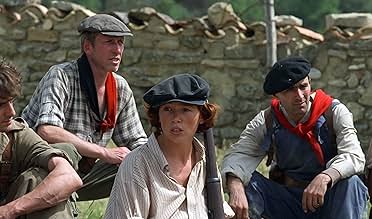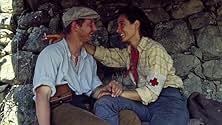David is an unemployed communist that comes to Spain in 1937 during the civil war to enroll the republicans and defend the democracy against the fascists. He makes friends between the soldie... Read allDavid is an unemployed communist that comes to Spain in 1937 during the civil war to enroll the republicans and defend the democracy against the fascists. He makes friends between the soldiers.David is an unemployed communist that comes to Spain in 1937 during the civil war to enroll the republicans and defend the democracy against the fascists. He makes friends between the soldiers.
- Nominated for 1 BAFTA Award
- 8 wins & 5 nominations total
- Maite
- (as Iciar Bollain)
- Juan Vidal
- (as Marc Martinez)
- Bernard Goujon
- (as Frederic Pierrot)
- Militia member
- (as Andres Aladren)
- Militia member
- (as Roca)
- Militia member
- (as Emili Samper)
- Director
- Writer
- All cast & crew
- Production, box office & more at IMDbPro
Storyline
Did you know
- TriviaAccording to Ken Loach, the debate in the village was the key scene in the film. He had local residents from the village play crowd members in that meeting.
- GoofsActually the rucksacks are the same as British 1908 pattern, and were made from 1929 onwards by La Industria Lonera in Barcelona, Spain.
- Quotes
[last lines]
Kim, David's granddaughter: The other day I found this. It was amongst my granddad's papers, and I just thought it was, like, fitting for him. It's a poem by William Morris, and I'd just like to read it out: "Join in the battle, wherein no man can fail. For whoso fadeth and dieth, yet his deeds shall still prevail."
- Crazy creditsSpecial thanks to the people of Mirambel and Morella.
- ConnectionsEdited from Caudillo (1977)
- SoundtracksA Las Barricades
Courtesy of Confederación de Nacional dl Trabajo
The movie pins the defeat of idealism represented in the Civil War on Stalin's perfidy. That was the selling out the POUM in the hope of gaining recognition from the `respectable' world. This simplistic argument ignores the deeper problems that beset the Republic and Stalin from the beginning. It is fair to point to Stalinist inspired deceit and to an extent the debate on securing the support of the West against Fascism was a salient factor uppermost in Stalin's mind in the late 1930s. But has history vindicated his actions? Without such tactics might the Soviet Union have faced the Nazi onslaught earlier and in an isolated position risked military defeat? Maybe so and the discussions on the issue goes on. But the film has attracted criticism because of its restricted view of events too. Veterans like Bill Alexander, a British commander in the (Communist) International Brigades, complained that the focus on the participants in the POUM undermined the role of those that fought in those Brigades. In other words the film suggests that it was merely the POUM that was betrayed and other volunteers were not equally as idealistic nor courageous in their defence of the Republic.
Of equal significance in any appraisal of the demise of the Republic/Idealism must be the reaction of the `respectable' Western Powers to the war. The treachery and cowardice for example of the British, French and American governments' provide a wider and clearer picture of the situation. While claiming to be officially neutral all the Western Powers ultimately aided Franco. By exploiting their majority on the absurdly named Non Intervention Committee established to police the International crises, Britain and France rendered the body a mere Fascist poodle by meekly kow-towing to German and Italian demands. Shallow British Conservative Party commitments to democracy were matched by the fragility of the French in their support of the Republic. Covert British Naval support, underpinned by the Higher Ranks fear of `Red' insurgency, was another negative factor. Moreover, Roosevelt's willingness to sell the Franco regime oil was also invaluable to a mechanised army.
After that brief explanation of the International situation now to the film. The basic structure Land and Freedom is as follows. A left-wing young Scouse communist goes to Spain, joins the Marxist POUM militia, and experiences at first hand serious political differences with the Communists and their competing militia. The story is based on the story of Eric Blair (George Orwell) described in his book Homage to Catalonia. There are also elements of Walter Gregory's book, Shallow Grave, in the tale too. While in the POUM this young man becomes further convinced of the right of their cause by the courage, ingenuity, generosity and radical nature of the armed struggle.
There is also a neat combination of different nationalities in the POUM ranks. Recruits come from America, Ireland (ex IRA inevitably), Italy, Germany, France, Scotland and of course Spain. These accurately although not perfectly reveal the Internationalist composition of the forces arrayed against Franco. However it is also worth bearing in mind that the Fascist enemy had an international flavour too. As well as Spaniards there were Moroccan Riffs in the Army of Africa along with Italians, Germans, Portuguese and British. Franco also received political assistance in America from Irish/American lobby groups concerned at the flagrant disregard of the Catholic Church in Republican areas. These were assisted by Joseph P Kennedy the father of JFK an enthusiastic American/Irish catholic and also a nazi sympathiser.
The movie stays faithful to this rather anti-clerical nature and to the situation in the country during the 1930s. A summary execution of a village priest symbolises the hatred felt by the working class toward such a conservative institution. Many peasants and industrial workers were deeply disillusioned with the Catholic Church's message of self-sacrifice for the masses while the Church continued to amass power and wealth for itself. These deep-seated feelings of anger go some way to explain why only 20% of the population in Spain attended mass. A figure inflated to an extent by the higher attendance of those at the top end of the social ladder. But it was not merely Republicans that killed priests. Nationalists murdered priests in the Basque country because they backed local autonomy from Madrid.
Feminist independence is also addressed as during the first half of the film women serve equally with men at the front in the POUM. They are just as brave as the men and in an early scene it is a woman who refuses to drill during training regarding it unnecessary. But once the Stalinist counter-revolution is successful the women are once again reduced to a subordinate position in the ranks. Their new duties become more traditional such as driving, cooking and nursing the wounded. Consequently the real social revolution is lost and the forces of reaction have indeed won the day. Later when the Stalinist forces, wearing orthodox uniforms and driven in military trucks, attempt to disarm and disband the POUM it is the killing of the woman that indicates the death of idealism.
To address the fundamental political idealism that initially attracted volunteers to the colours and to highlight the essential potential conflicts between them. Loach attempts definitively to define what he means by his emotive linking of two basic concepts of Land and Freedom. At about the half way point in the movie a debate amongst villagers, peasants and POUM militia is meticulously presented that seeks to find an agreed policy for the newly captured territory. One villager wants the transfer of land ownership to pass into individual hands while a woman argues alternatively for collectivisation. A classic Bakuninist position. The American militia member (later to defect to the Communist/Stalinist forces) argues for a more moderate accommodation that allows individuals to own land/property. He points out that only modest land reform can benefit the anti-Fascist Front because by radically altering property rights it will only alienate countries whose assistance the Republic needed to be successful. This takes the Stalinist line of reconciliation with the West rather than the Trotskist argument of International revolution/socialism. Other militia members offer variations of Marxism, which fits neatly into their reasons for participation in the war while after a vote is taken (symbolising peasant democracy) the radical collectivisation policy is endorsed. Naturally when the Stalinists force the POUM into the Internationalist Brigades and the moderate America is with them it can be assumed that such radical ideas are to be consigned to the dustbin.
Having said all that the film is still very good. Movies about the very important war in Spain are a rarity especially since the 1940s. Thus a plus point immediately. On a moral level the tale of betrayal and lost hope is excellent even if the issues are rather shallow. As for the anti-Stalinist line it is irrefutable that Stalin wanted to appease the Nazi's in the period. Stalin was also concerned with the attitude of other Western Governments' and keen to appear `respectable' to them. For the same basic reason, that is a fear of Fascist militarism and what the consequences were for the identified Nazi enemy, the Soviet Union. This better explains the line taken in Spain by the communists than simply a desire to destroy the revolution, as the movie implies. As for the implication of stolen idealism and treachery forced only onto restricted units that fought Franco. Loach in making a film cannot be expected to include all the different kinds of military elements that made up the anti-Fascist alliance. By concentrating on a single entity the unit that Orwell fought and was wounded in, the film stays loyal to its principle source and concentrates focus not constrains it. It might not be perfect but it happens to be by far the best we have on such an important topic.
- How long is Land and Freedom?Powered by Alexa
Details
- Release date
- Countries of origin
- Languages
- Also known as
- Tierra y libertad
- Filming locations
- Production companies
- See more company credits at IMDbPro
Box office
- Budget
- £2,500,000 (estimated)
- Gross US & Canada
- $228,800
- Opening weekend US & Canada
- $8,144
- Mar 17, 1996
- Gross worldwide
- $228,800
- Runtime1 hour 49 minutes
- Color
- Sound mix
- Aspect ratio
- 1.66 : 1
Contribute to this page
































